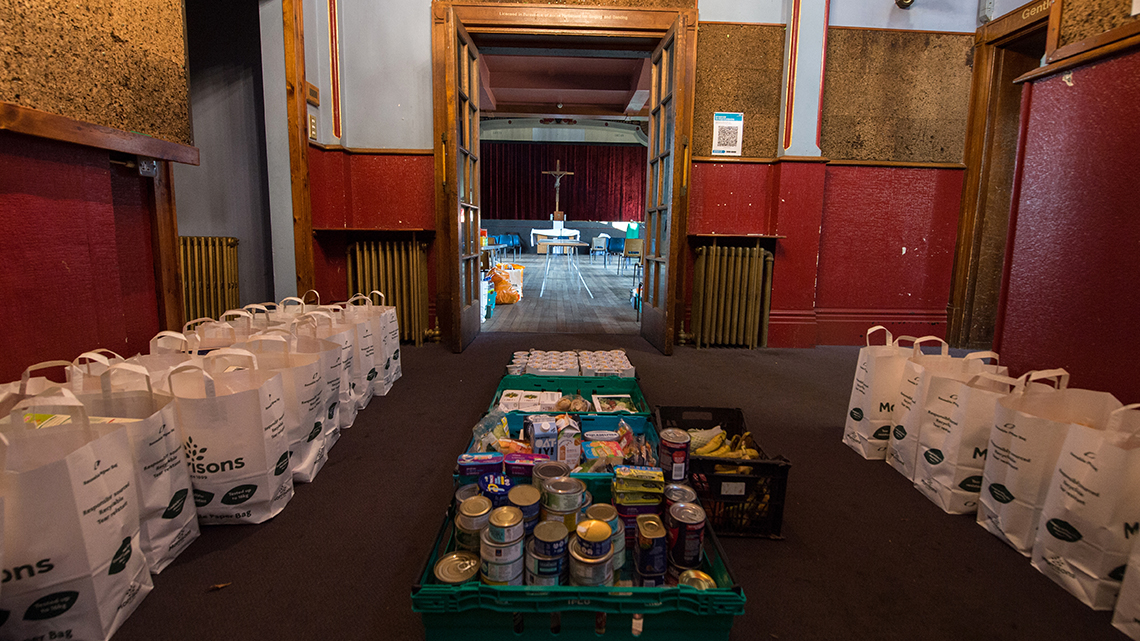Palmers Green Foodbank Credit: CBCEW
With food poverty on the rise as a result of COVID-19, the Dioceses of Westminster and Cardiff have responded by providing urgent food relief to the most vulnerable. Over 14,000 people have been supported through the creation of two supermarket voucher schemes. Digital vouchers have been used as a flexible, safe way to help parishes and schools support those most in need.
16 April 2021 marks a year since Caritas Westminster distributed their first emergency supermarket vouchers in response to the COVID-19 pandemic. As the effects of the pandemic set in, Parish Priests saw more requests for help and church foodbanks witnessed demand increase by up to 400%. The supermarket voucher scheme has helped alleviate pressure on foodbanks, allowing them to deliver food to those shielding. It also gives families the dignity of shopping for their own tastes and needs. As one Parish Priest reflected ‘it has given genuine ease of mind and relief to recipients’.
The scheme proved a success with 123 parishes and schools within the Diocese of Westminster distributing vouchers to vulnerable families in their communities. A year later, the scheme is still running with generous support from the St. John Southworth Fund, the Albert Gubay Charitable Foundation, and the Cardinal’s Lenten Appeal. Over £200,000 has now been distributed in Westminster Diocese, with initial data showing 7,374 people have been supported.
With numerous parish-led food poverty projects already underway within the Archdiocese of Cardiff, the potential of a supermarket voucher scheme in South Wales and Herefordshire was quickly recognised. Working in collaboration with colleagues from Westminster, the Archdiocese of Cardiff launched their own supermarket voucher scheme in December 2020. Aided by support from Barclays Bank, the Albert Gubay Charitable Foundation and the National Lottery Community Fund, nearly £130,000 worth of vouchers have been distributed across 77 parishes and schools, supporting 6,823 people.
Behind these figures are the personal stories of families facing sometimes impossible choices. One mother described the vouchers as ‘a gift from God’, explaining that they meant she did not have to choose between paying her rent and buying food. Another parent said ‘with these vouchers … I can at last get myself and my daughter a decent meal.’ One child in South Wales, upon being given the vouchers by a teacher, responded, “Thank you Miss, how did you know we had run out of food?”.
Working collaboratively has enabled the Archdioceses of Westminster and Cardiff to support a huge network of 200 parishes and schools, allowing them to distribute £332,200 to 14,197 people so far. The vouchers have reached some of the most vulnerable, including those left with little or no income due to the pandemic. Data from Westminster shows that 39% of those receiving vouchers were not in work either because they had lost their job during the pandemic or have been unable to work due to shielding, caring responsibilities or disability. Another 40% of recipients needed vouchers due to low income, with their wages not stretching far enough to feed their families and pay their bills.
Despite this emergency food relief being a crucial source of support to many during the pandemic, it is not a long-term solution to food poverty. The issues raised by COVID-19 extend beyond food poverty. The dioceses of Westminster and Cardiff have developed broader initiatives during the pandemic running alongside their voucher schemes. An estimated 30,000 people have been helped through the Archdiocese of Cardiff’s flagship ‘Staying Together While Apart’ project, which focuses on improving mental health and wellbeing. At Caritas Westminster the ‘Road to Resilience’ programme has begun, equipping parishes and schools to tackle the root causes of food poverty.
Reflecting on the food vouchers scheme, Cardinal Vincent Nichols commented,
‘The pandemic has exposed and exacerbated the scale of need in our society, where some struggle everyday with the uncertainty of how they will pay their bills or put food on the table. During this time I have been deeply moved to see Catholic churches and schools reaching out to support those in their local communities who are struggling. The supermarket voucher schemes in Westminster and Cardiff have been a crucial part of this response, protecting the dignity of those who use them to access food and essentials. I am pleased to see Dioceses working together in England and Wales to provide this emergency support and help people back on their feet as we emerge from the pandemic. I am grateful to all who have contributed generously to this scheme.’
Echoing Cardinal Vincent’s sentiments, Archbishop George Stack extended his gratitude to those who have worked to make the food voucher initiatives a success:
‘It is sad to say that the need for support within our communities has grown over the past year. The collaboration between both dioceses has again shown the impact that the Church is making across the UK. Those who serve their community are often called “unsung heroes”. It is my hope that parish priests and volunteers, who have done so much to support others at this time, appreciate that collectively they are undertaking an “heroic” effort combating the effects of the pandemic. I want to thank everyone, known and unknown, for all that they are doing in support of others’.
As one year is marked since the start of the voucher scheme in Westminster, the need for support has far from abated. The voucher scheme in the Archdioceses of Westminster and Cardiff are continuing into the coming months, furthering the support already provided.
Source: caritaswestminster.org.uk

